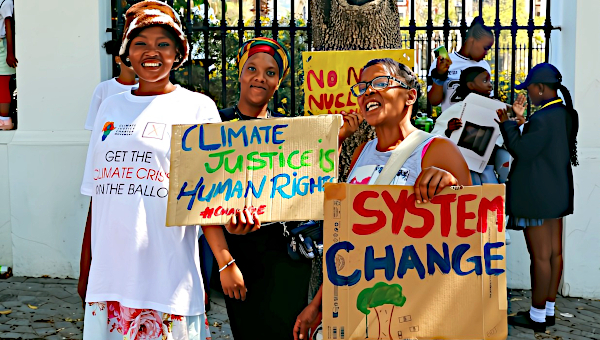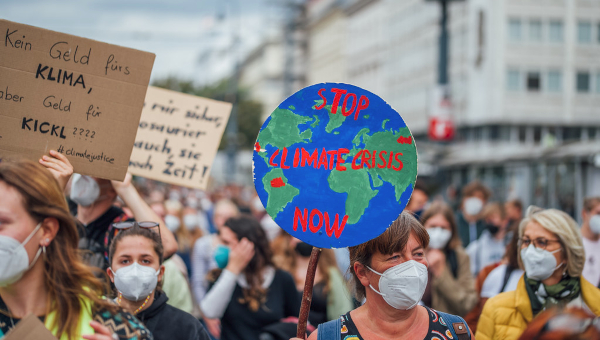Iberian Blackout: Shutdown Private Profit to Promote an Ecosocialist Transition
The Anticapitalistas, a socialist project in the Spanish state, issued the following statement in the wake of the giant blackout throughout the Iberian peninsula last week. I think this is a useful guide to outlining the ecosocialist response to the energy crisis. Here is a machine translation, slightly edited for clarity. — Richard Fidler

Last Monday [April 28], the entire Iberian Peninsula lost power overnight. The causes that led to the fluctuations in the electrical grid are still unknown, and we must reject any misinformation or opportunism in this regard. In this sense, the working class, through its unions and social organizations, must have the right to participate in the investigation of the causes of the event. However, the political dimension of the event goes beyond the specific causes. The public discussion generated by the blackout will have short- and medium-term consequences. That is why we want to highlight four conflicting elements.
1. Neither nuclear nor fossil fuels provide us with security. We strongly reject any renewed commitment to promoting nuclear and thermal power plants. Nuclear power depends on uranium extraction, poses a continuous risk, and ties us to the indefinite management of nuclear waste. Furthermore, in the case of the blackout, nuclear power plants were the first to shut down, worsening the situation. Thermal power plants generate dependence on gas extraction and imports and are leading us toward climate devastation. The only path we must take is toward a 100% renewable electricity system that eliminates fossil fuels and facilitates an energy transition for other sectors, such as industry and transportation. This poses additional challenges for the management of the electricity grid, but sufficient solutions exist to address them.
2. The energy transition is urgent, and private profit is an obstacle. Our electricity system was privatized through various reforms between 1988 and 1998, and this has serious consequences for the energy transition. This divided the generation, transmission, distribution, and marketing of electricity, opening the door to fragmented and uncoordinated private initiatives. The electricity system operator (REE) is 80% privately owned, and despite the 20% public stake, its behavior is geared toward maximizing dividend distribution. This makes it difficult to develop the investments necessary to move toward a 100% renewable electricity system. Generation remains dominated by the electricity oligopoly, and renewable development is driven by profit maximization. This means that renewable energy installations are carried out in a haphazard manner, prioritizing the lowest-cost locations and aggressively deploying them across the territory, generating legitimate unrest along the way and slowing down if profit expectations decline. Distribution networks in the hands of the private companies of the electricity oligopoly imply a lack of investment and maintenance, and privatized distribution prevents guaranteed access to a basic electricity supply, generating more than 7,000 deaths from energy poverty each year.1 Overall, a privatized electricity system represents obstacles of scale, speed, and coordination to developing the urgent energy transition.
3. The energy transition also requires other sociopolitical transformations. Beyond the electricity system, abandoning fossil fuels requires much deeper transformations. This entails enormous political battles, aimed at achieving a reduction in energy demand through energy-efficient housing renovations, reducing dependence on private vehicles and massively expanding public transportation, or structurally transforming the industry to meet social needs. None of these transformations are guaranteed, and without them, an energy transition will not be possible. That is why we must foster the struggles and conflicts that advance in each of these areas.
4. There is no time to waste; we need planning and public ownership. The urgent energy transition demands that we free ourselves from the private ownership that hinders and slows down the necessary transformations of the electricity system and many other sectors. While the electricity companies amass millions in profits each year, there is still a long way to go. We need greater planning and coordination capacity, and that is not possible while these companies prioritize dividend distribution. Likewise, the current use of public participation in companies like REE makes no difference to their corporate behavior. That’s why we must emphatically affirm the necessary socialization of the entire electricity system. Public ownership is a necessary condition for taking control of the energy transition and ensuring planning. This public ownership must serve as a lever to expand the democratic participation of working people and the affected territories, and to promote other sociopolitical transformations that reduce energy demand.

In short, the public discussion following the blackout cannot be limited to the technical causes; it must address the political and economic roots, framing the dispute around an ecosocialist transition with democratic planning. It is obvious that capitalist governments are not going to promote transformations in this direction. Their objective is to guarantee private profit, even at the cost of investing public resources to achieve this goal. To change this logic, we need a working-class political movement that fights in an organized way for improvements here and now, but that also aims for the constitution of another type of state, capable of confronting the great challenges we face as a society. If the ruling class has opted for the rearmament plan, the working classes must be committed to an ecosocialist transition that reorganizes the use of resources and proposes a different way of being in the world.
At this moment, this is reflected in two slogans:
For the expropriation of the electricity companies!
Public planning and ownership for the energy transition!
Endnotes
- The attributed deaths are apparently extrapolated from the kinds of data reported here.





